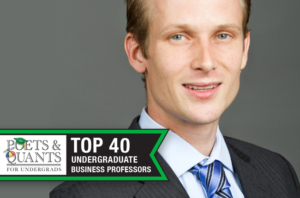Arthur van Benthem
Assistant Professor of Business Economics and Public Policy
University of Pennsylvania, The Wharton School
Green energy, electric cars, solar and wind power, fuel economies, and solar subsidies are just a handful of the environmental and energy issues that Wharton’s Arthur van Benthem conducts research in and is an expert. His work specializes in environment and energy economics and uncovers the unintended consequences of environmental legislation and economic efficiency of energy policies.
In addition to his role as one of Wharton’s top professors, van Benthem is a faculty research fellow for the National Bureau of Economic Research and a research affiliate for the Centre for Economic Policy Research. In the last five years, he’s accumulated over a half million dollars in grant funding to pursue his research. At the undergraduate level, he teaches a course called Environmental & Energy Economics and Policy wherein by the close of the course, undergraduate students are able to make immediate, real-world applications such as the economics and finance of renewable energy and policies to increase it. Also, heavily debated subjects such as fuel-economy standards and subsidies for green vehicles. This year, van Benthem received an Excellence in Teaching award for the course.
Age: 37
At current institution since: 2012
Education: PhD, Economics, Stanford University, 2012; BS & MS, Econometrics; University of Amsterdam, 2003; in between at Royal Dutch Shell in the long-term energy scenarios team.
List of courses currently teaching: Energy & Environmental Economics and Policy; Energy Markets and Policy
Fun fact about yourself: As a kid, I was fascinated by trains. I built an elaborate system of railway stations and trains in our back yard including a detailed timetable and a news magazine.
“I knew I wanted to be a business school professor when…” I realized that many b-school students will move on to becoming leaders in firms that will shape society’s environmental footprint. My course on energy and environment may well be the only course in this field they’ll ever take. So I wanted to weigh in by teaching you how sound economic thinking can help you become a successful and environmentally responsible business leader at the same time.
“If I weren’t a business school professor…” I would be a journalist or a politician
What do you enjoy most about teaching undergraduate business students? They are energetic, smart and talkative. I love playing energy strategy simulations and see the students get really competitive to make money in a complicated electricity market.
What is the most impressive thing one of your undergraduate students has done? So many examples. From starting a company, to being accepted to Stanford’s super-selective Ph.D. program in Statistics, to coding the solution to a problem that I thought was too hard to solve…
What are your hobbies? I spend way too much time following U.S. and European politics. Other than that, I am a huge soccer fan and still think (dream) that Ajax Amsterdam is one of the major teams in Europe.
Favorite place to vacation: The National Parks in the western U.S. Showing Yosemite to my two and five year old kids was amazing. I also recommend U.S. Route 395.
Favorite book: Karakter. It’s in Dutch, but worth the effort.
Favorite type of music and/or favorite artist: Rather eclectic. I love Dire Straits, Bruce Springsteen, Dutch popular music, and country.
What professional achievement are you most proud of? My teaching awards for new curriculum development. I am proud that, after a joint effort with my energy colleagues, Wharton now has a lot to offer for students who want to pursue a career in energy.
What is your most memorable moment as a professor? Inviting several energy CEOs to my class and interviewing them about tough energy-environment dilemmas. For instance, right in the middle of the fossil fuel divestment movement, I could ask the President of Shell U.S. in a public forum whether Penn should keep or sell its oil company stocks. (His response was excellent, by the way.)
Professor you most admire and why: Lucie Flothuis, my high school history teacher, for teaching me useful lessons about life. Cars Hommes at the University of Amsterdam for showing me what excellence in teaching means. Mark Duggan for being a star economist, energetic manager and great mentor all at the same time.
What are you currently researching and what is the most significant discovery you’ve made from it? My research is about which types of energy and environmental policies are smart and effective, and how to distinguish them from poorly designed policies that have unintended consequences. My research on optimal solar subsidies has fed into California’s decision making process for the “California Solar Initiative”. I also do a lot of research on vehicle policies. For instance, my co-author Mark Jacobsen at UCSD and I found that fuel-economy standards for new vehicles postpone the scrappage of dirty old vehicles, partially undermining the standards’ effectiveness.
Twitter handle: @ArthurvBenthem
“If I had my way, the business school of the future would have much more of this…” Courses that make students masters of collecting, processing, and statistically analyzing data, and presenting the results in an engaging and convincing way. To achieve this goal, you really need to know some modern econometrics (yes, that takes some effort, but you’ll be thankful in five years’ time!). No b-school student should ever be tempted to confuse correlation with causation; neither when agonizing over a key investment decision nor when reading the newspaper.
“And much less of this…” Students being obsessed with and stressed about internships during their summers. Instead, you should use this unique phase of life to travel the world and take a couple more “business-irrelevant” courses in whatever topic that fascinates you.












Questions about this article? Email us or leave a comment below.